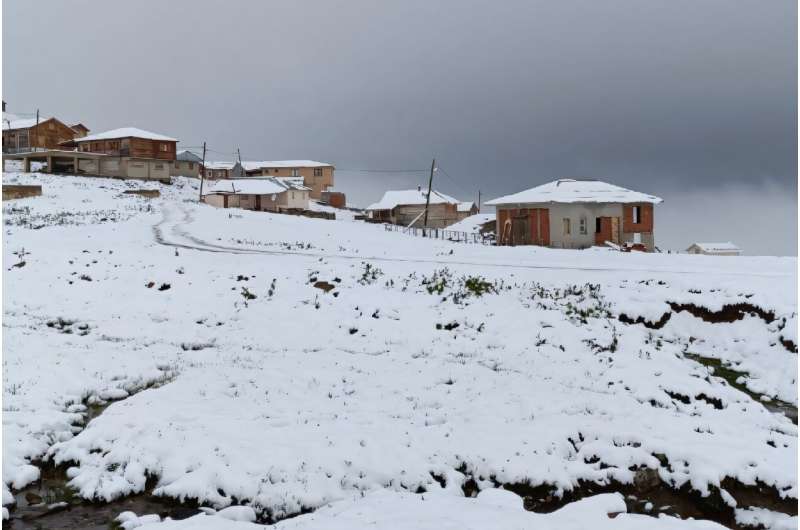A rare and unexpected blanket of heavy snow fell on parts of northeastern Turkey on Friday, creating a stark contrast as the rest of the country endured sweltering summer heat and battled wildfires. This unusual weather event was reported by local media and highlights the increasing frequency of extreme weather patterns attributed to climate change.
Temperatures plummeted in several mountainous regions inland from Rize, a town on Turkey’s northeastern Black Sea coast, situated approximately 120 kilometers from the Georgian border. The snowfall covered an expansive area, stretching at least 100 kilometers from the Anzer Yaylasi plateau through the Kackar Mountains National Park.
Unprecedented Weather Patterns in Rize
Gencaga Karafazlioglu, a local journalist from Rize, expressed his astonishment at the rare July snowfall. “It’s been snowing for about four or five hours. I’m 65 years old, I’ve lived in Rize for most of my life, and this is the first time I’ve seen snow in July,” he told AFP. The region, known for its lush greenery and heavy rainfall, is no stranger to weather anomalies, but July snow is unprecedented in recent memory.
“In Rize, we’re used to weather anomalies. We’ve had snow several times in March but never this much. The older generation say they saw snow in July 30 or 40 years ago but never this much,” Karafazlioglu added. The snowfall was particularly heavy in Ovit Yaylasi, a plateau located 2,500 meters above sea level, where fields were blanketed in white, as shown in social media footage.
Climate Change and Extreme Weather Events
Experts attribute these unusual weather patterns to human-driven climate change, which is causing more frequent and intense extreme weather events globally. From droughts to heatwaves and hailstorms, the impact of climate change is becoming increasingly evident.
According to climate scientist Dr. Elif Yildiz, “The occurrence of such extreme weather events is a clear indicator of the changing climate. Regions that are typically warm during this time of year are experiencing unexpected cold spells, while other areas are facing unprecedented heat and wildfires.”
“The occurrence of such extreme weather events is a clear indicator of the changing climate.” — Dr. Elif Yildiz
Simultaneous Wildfires in Western Turkey
While northeastern Turkey was blanketed in snow, firefighters in Izmir province, located some 1,600 kilometers to the west, were battling a series of wildfires. The region was forecast to experience temperatures soaring to 40 degrees Celsius (104 degrees Fahrenheit) in the coming days, exacerbating the fire risk.
The stark weather contrast across the country underscores the diverse climatic challenges Turkey faces. As the northeast grapples with unexpected snow, the southwest is dealing with the threat of wildfires, highlighting the urgent need for comprehensive climate adaptation strategies.
Historical Context and Future Implications
Historically, Turkey has experienced varied weather patterns, but the current extremes are raising concerns among scientists and policymakers alike. The last recorded instance of July snow in Rize was decades ago, but the intensity and scale of the current event are unprecedented.
Looking ahead, experts emphasize the importance of proactive measures to mitigate the impacts of climate change. “We need to invest in sustainable practices and infrastructure to better prepare for these extreme weather events,” Dr. Yildiz noted.
As Turkey navigates these climatic challenges, the need for international cooperation and robust climate policies becomes increasingly critical. The events in Rize and Izmir serve as a reminder of the urgent need for action to address the global climate crisis.
